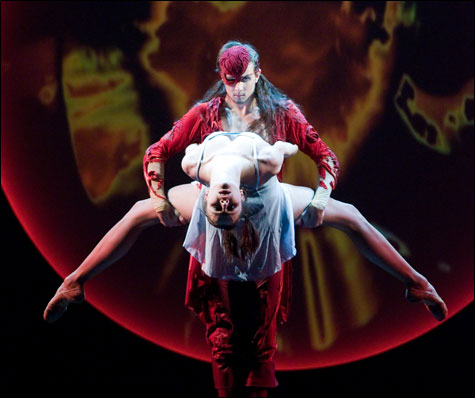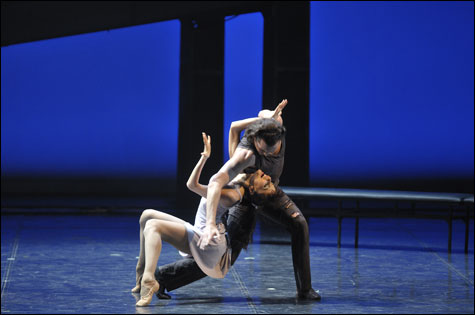
TATIANA AND ONEGIN: All you have to do is dream. |
In the program note to his Eugene Onegin, which St. Petersburg's Eifman Ballet is presenting at the Cutler Majestic Theatre this weekend, Boris Eifman writes, "I transported Pushkin's characters to our times. . . . I needed that experiment in order to answer the question that troubles me: what is the Russian soul today? Has it preserved its uniqueness, its mystery, its attraction?" While the company founder and choreographer ponders that question, he can rest assured that Eifman Ballet has preserved its uniqueness, its mystery, its attraction. Also its agony, its ecstasy, its drama, its melodrama, and its tendency to be generic. The weakness of this Onegin is that it's about the Russian soul and not about Russian souls.
Still, Eifman hews closer to Pushkin than he did to Chekhov (The Seagull) here in 2007, or Tolstoy (Anna Karenina) in 2005. His evening-length (it runs just two hours, with one intermission) adaptation of the 1837 novel in verse is balletic, and acrobatic, but not on pointe; the score combines (mostly minor) Tchaikovsky with music by Russian rocker Alexander Sitkovetsky of Autograph. It begins with three comrades, whom we make out to be Onegin (Oleg Gabyshev last night), a guitar-strumming Lensky (Dmitry Fisher), and — as a glance at the program reveals — the "Colonel" (Sergei Volobuev), all sitting at a table while, on a large disc overhead, the Soviet Union collapses. Cut to a backdrop that looks like the Bunker Hill Bridge and the company, in gray proletariat warm-ups, cavorting like the kids in High School Musical while, on the disc, ballerinas go through their paces. Cut to a bamboo curtain (student digs?) before which Onegin and Lensky play out a languid duet of burgeoning friendship. Then it's night at the bridge, under a moth-eaten moon, and we're introduced to sisters Tatiana (Maria Abashova) and Olga (Natalia Povoroznyuk), the one serious in braids, the other flirty with bangs and a shorter skirt. Lensky appears and kisses Olga, then introduces Onegin to Tatiana, who's reluctant to forsake her book. Finally, they dance, to a snippet from the slow movement of Tchaikovsky's First Piano Concerto: he scuffs the ground, she puts her head on his shoulder, and it gets hot and heavy (pace Pushkin) before he leaves.

LENSKY AND OLGA: Saving the last dance. |
Shouldn't modern Tatiana now text-message? Perhaps, but Tatiana's letter to Onegin is the most famous set piece in Russian literature — its opening words, Ya k vam pishu ("I write to you"), were known even to every Soviet schoolchild — and in fact we hear much of it, spoken in Russian (no subtitles). The letter is rejected; she does a solo of despair and then dreams that monsters in chthonic neon red tear off her dress and unbraid her hair, leaving her in a short nightie and with flowing tresses to greet Onegin, to whom she gives herself with unmitigated abandon — but not before the obligatory (for Eifman) crucifixion scene. Back in real life, Onegin quarrels with Lensky (Eifman justifies this in the program by juxtaposing two unrelated sections of the poem) in front of a burning circle of lights and then bares his tortured (because he loves Lensky and not Tatiana?) soul to the strains of Tchaikovsky's Francesca da Rimini (in Dante, remember, Francesca gave way to forbidden love). At Tatiana's name-day celebration, she carries her single-candle cake about sadly while Olga, now in come-hither red, dances with Lensky — until Onegin cuts in. The bad feeling escalates; somehow Onegin produces a knife and stabs his friend. (Yep, no duel.) Lensky dies kissing Olga while Tatiana stands on the bridge holding her cake.